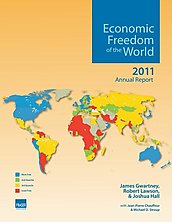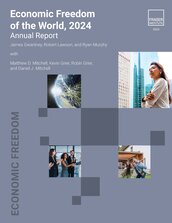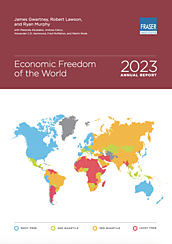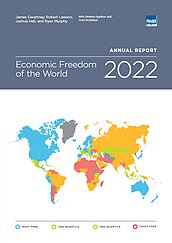This year’s report notes that economic freedom fell for the second consecutive year. The average economic freedom score rose from 5.53 (out of 10) in 1980 to 6.74 in 2007, but fell back to 6.64 in 2009, the most recent year for which data are available. In this year’s index, Hong Kong retains the highest rating for economic freedom, 9.01 out of 10, followed by Singapore, New Zealand, Switzerland, Australia, Canada, Chile, the United Kingdom, and Mauritius. The world’s largest economy, the United States, has suffered one of the largest declines in economic freedom over the last 10 years, pushing it into tenth place. Much of this decline is a result of higher government spending and borrowing and lower scores for the legal structure and property rights components.
This year’s report also contains new research comparing policies that promote “freedom” compared to “entitlement” in relation to economic development. The findings suggest that fundamental freedoms are paramount in explaining long-term economic growth. Countries that favor free choice — economic freedom and civil and political liberties — over entitlement rights are likely to achieve higher sustainable economic growth and to achieve many of the distinctive proximate characteristics of success identified by the Commission on Growth and Development (World Bank, 2008). In contrast, pursuing entitlement rights through greater coercion by the state is likely to be self-defeating in the long run. The report also includes findings on the positive relationship between increases in economic freedom and improvements in women’s well-being.




